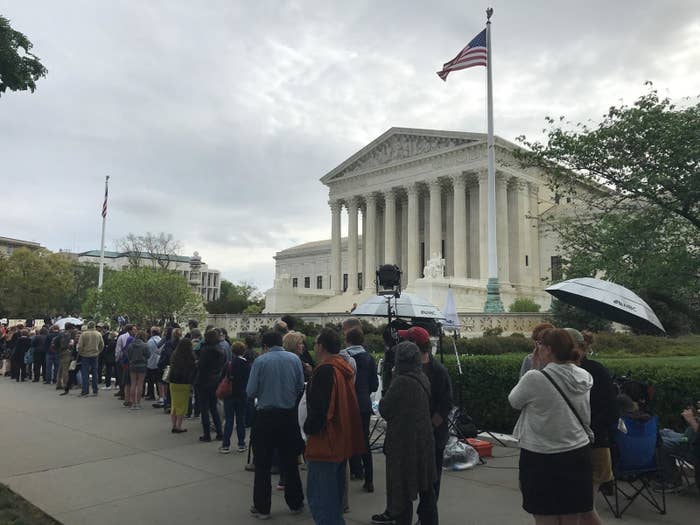
WASHINGTON — The US Supreme Court appeared poised to side with Trinity Lutheran Church of Columbia in arguments Wednesday in a closely watched church versus state case out of Missouri.
The case centers on a playground at a preschool operated by the church — and whether Missouri can bar the church from competing for state funds to resurface the playground with rubber made from recycled tires.
While the specifics of the case might seem less than — groundbreaking, the questions at oral arguments focused on the extremes, limits, and lines involved in issues that have long vexed the Supreme Court about the First Amendment's Free Exercise and Establishment clauses — and the so-called "play in the joints" between the constitutional mandates allowing for religious freedom and preventing government entanglement with religion, respectively.
The long-awaited Supreme Court arguments in Trinity Lutheran Church of Columbia v. Comer — which the court initially agreed to hear more than a year ago — tilted heavily in favor of the church on Wednesday.
The church sued Missouri's director of the Department of Natural Resources after its grant application was rejected in 2012 based on a state constitutional provision barring public funds from being given to support any church.
The church argues that the "categorical exclusion of religious organizations" is religious discrimination that is not allowed under the Free Exercise Clause. The state counters that the "play in the joints" between the Free Exercise and Establishment clauses allows states to do what it is doing here.
If the court resolves the case on its merits, Trinity Lutheran appears likely to win in its challenge to Missouri's decision that the church was barred from participating in the state's Scrap Tire Grant Program — a competitive grant reimbursing nonprofits for using recycled tire rubber for playground surfaces.
The case itself rests on the premise that there would be no Establishment Clause violation if Missouri allowed churches to participate in the program. The question before the court is whether it violates the Free Exercise Clause to bar churches from participating in the program.
Many thought the case, granted by the court in January 2016, was being held up because of a concern that the court wanted to avoid a 4-4 decision.
After arguments, however, it appeared that a more lopsided decision was likely — even setting aside the recent addition of Justice Neil Gorsuch to the bench. What was not clear was the specific way the court would resolve the case — including what specific reasoning might be used and how broadly the decision would be written.
In addition to the conservatives, Justice Elena Kagan and, to a slightly lesser extent, Justice Stephen Breyer also expressed skepticism regarding the state's argument in the case. (Justice Clarence Thomas asked no questions, as is his usual practice.)
At one point in the arguments, Kagan said outright that the state's program created a "burden on a constitutional right" — a decision that would make it very difficult for the state to show its exclusion of the church from the program is constitutional.
And while many were watching to see the sort of questions that Gorsuch would bring to the arguments — he's expressed strong support for religious liberty-related protections in the past — he only spoke up in the closing minutes of the arguments. When he did, though, he referred to the state's treatment explicitly as "religious discrimination."
In addition to the free exercise question — and the church's related equal protection claim — there also are some procedural questions raised in recent months and, even, days about the case.
Since the appeals court ruled against the church in 2015 and since the Supreme Court agreed to hear the challenge in early 2016, however, statewide elections were held; a Republican governor and attorney general replaced the former Democratic governor and attorney general. And just this past week, on April 13, the governor announced a new policy allowing religious groups to apply for the grants.
In addition, the change in administrations led to the unusual situation that the new attorney general — Josh Hawley — recused himself from the case due to the fact that he previously supported the church's efforts before election. The acting attorney general on this issue appointed James Layton — who had been the state's top appellate litigator under the previous attorney general and had argued the Trinity Lutheran case at the appeals court — to argue it at the US Supreme Court.
The Supreme Court on April 14 asked the parties whether the case was affected by the new governor's policy. Both said it did not render the case moot — a position that appeared on Wednesday to be held by most of the court's justices as well. Although Justices Ruth Bader Ginsburg, Breyer, and Kagan raised questions about the posture of the case, it appeared unlikely that a majority of the court was interested in disposing of the case without answering the question raised by the church.
